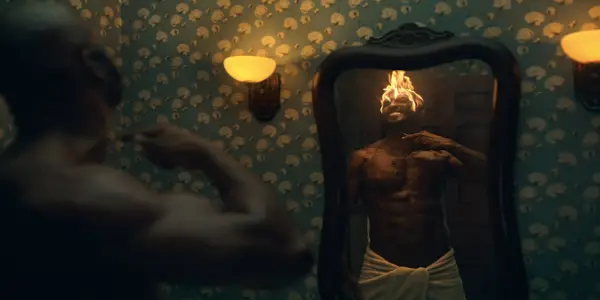Of all the changes that were made to American Gods between seasons 1 and 2, one of the most notable is the way each episode begins. In season 1, the episodes would often begin with short vignettes, telling a “coming to America” story. These shorts would show how certain cultures and religions brought their gods to America, and how they adapted their worship and belief to a new world.
These vignettes are prevalent throughout the novel that the show is based on, and offer up some of Gaiman‘s finest prose throughout the story. The vignettes were beautifully stylized, with a tone that felt different from the rest of the show, so that we could feel that they were separate stories. But perhaps due to changes in staff on the production end of the show, season 2 has so far not seen the likes of these mini shorts thus far.
In Case You Missed It
However, this latest episode (and the official midway point of the season!) did bring us something that felt familiar. Through a slow motioned and ethereal flashback, we are shown the story of Will “Froggie” James, a black man who was lynched and murdered in Cairo for the alleged murder of a white woman. Shadow shoots awake from the flashback and is haunted by images of Will for the remainder of the episode.

Mr. Ibis (who is still being powered by a delightful performance from (Demore Barnes) remains with Shadow to tell him the story of Will, who has cursed the black community of Cairo. We learn that the bodies that Ibis has been working on have largely been a result of Will’s curse, including the relatives of Ruby Goodchild, who has been mourning the death of her family in Ibis’s funeral parlor for the past several episodes.
Laura and Mad Sweeney continue their quasi-sexual relationship as they travel to New Orleans in order to help bring Laura back to life. They engage in a surreally depicted orgy with Maman Brigitte and The Baron, who help Laura regain true feeling in her undead body.
Rounding off the crew of our core cast, (does this show even have a core cast?) The Jinn, Salim and Wednesday travel to the dwarves in an effort to get Wednesday’s spear repaired. There’s a lot of great back and forth with this trio, as Wednesday half-heartedly tries to get Salim to worship him, but Salim is devoted to Allah, much to the chagrin of The Jinn.
Salim and The Jinn have an interesting relationship. Salim spends episode after episode pining after The Jinn, but other than the fact that Salim had one incredible night in bed with The Jinn, I’m not sure why. Salim remains a faithful servant of his own god. Hopefully, the show explores their relationship further and gives us answers as to why Salim is so taken with The Jinn, who cares so little either way (or so he’d have us believe).
Timely Troubles
American Gods has always been about reflecting what America was, is, and will become. The show has taken turns from the novel so that Gaiman and his team of writers can explore themes that the book touches on, and any that might not have occurred to Gaiman at the time. Race is certainly playing a huge factor in the show if these last few episodes are any indication of the future of American Gods.
This episode was a poetic and brutally realistic look at the plight of African Americans in America. In one of the most powerful lines of dialogue thus far in the show, the priest that is presiding over the funeral of Ruby Goodchild says, “Leave here. If you find somewhere our people aren’t catching hell, you let me know where it is. I’ll come running.” It’s a haunting scene that speaks for itself in its message and its emotion.
When we consider Shadow, a man who has had the world thrown against him, who has his work cut out for him in a game that he is ultimately bound to lose, we see his connection to others in America that are dealt unfair hands. He’s representative of the plight of the “other” in this country, and is perhaps beginning to realize that within himself.
With this in mind, American Gods seems to be finding its sweet spot in what it wants to represent. What it’s here to say. American Gods is here to talk about race in our country. It wants to talk about how those who don’t have white skin have always been treated in this country. The ties between the past and the present of this show present a hard and necessary look at the America we live in today, and how it has been built from a repetition of past behavior.
With how scattered and spotty the show has been this season, I can only hope that they’ll follow this thread that they’ve found. The message is sometimes muddled and the themes are all over the place, but this show wants to say something important, and I hope that it finds what it truly wants to say soon.
What did you think of this weeks episode of American Gods? Let me know in the comments below! Check back next week, I’ll see you then!
Does content like this matter to you?
Become a Member and support film journalism. Unlock access to all of Film Inquiry`s great articles. Join a community of like-minded readers who are passionate about cinema - get access to our private members Network, give back to independent filmmakers, and more.